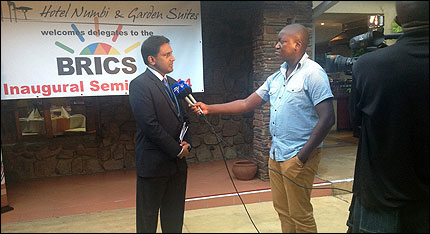Nelspruit, South Africa — In a ground breaking high level meeting of BRAZIL, RUSSIA, INDIA, CHINA and SOUTH AFRICA (BRICS) agreed to cooperate on population matters.
The demographic transition and post-transition challenges, including population ageing, unprecedented mortality reduction, yet stubbornly unacceptable levels of maternal and infant mortality, persistently- gender based violence, huge level of exclusion of adolescents and young people from developmental opportunities are amongst some of the most important challenges facing the world today. To address some of these challenges, representatives of the Federative Republic of Brazil, the Russian Federation, the Republic of India, the People’s Republic of China and the Republic of South Africa (BRICS), met in Hazyview, South Africa, on 1 – 3 March 2014 at the BRICS Inaugural Seminar of Officials and Experts on Population Matters agreed to collaborate through dialogue, cooperation, sharing of experiences and capacity building on population related issues of mutual concern to Member States.
The framework for cooperation on Population Matters of BRICS is based on the guiding principles of the ICPD Programme of Action.
The senior officials of BRICS member countries recognized the vital importance of the ‘demographic dividend’ that many of the member states possess to advance their sustainable development as well as the need to integrate population factors into national development plans, and to promote a long-term balanced population development.
The senior officials of the BRICS member countries confirmed their strong commitment to address social issues in general and in particular gender inequality, women’s rights and issues facing young people. They reaffirmed their determination to ensure sexual and reproductive health and reproductive rights for all, strongly encouraged collaboration between Member States in the build-up to the International Conference on Population and Development beyond 2014 including as a means to contribute to the UN Development Agenda beyond 2015. This will be achieved by drawing upon the knowledge, experience and expertise available in academia, civil society and the private sector among the BRICS member states.
Dr. Joe Thomas, Executive Director of Partners in Population and Development (PPD) participated in the BRICS Inaugural Seminar of Officials and Experts on Population Matters noted the scope off South-South Cooperation and Triangular cooperation as an appropriate paradigm for the framework for cooperation on population matters among BRICS member states.
BRICS leadership reconfirmed their strong commitment to address population issues; in particular gender inequality, women’s rights and issues facing young people. PPD appreciated the determination of BRICS’s to address the sexual and reproductive health and reproductive rights among its member states.
As a discussant of the BRICS inaugural meeting, Dr. Thomas said that ‘PPD would like to contribute to the ongoing dialogue on population policies and program challenges of BRICS countries and called to utilize the unprecedented global opportunity of south-south cooperation for population and development.
 Dr. Joe Thomas, Executive Director of PPD
Dr. Joe Thomas, Executive Director of PPD
in an interview on SA TV in South Africa
In an interview with the SA TV Dr. Thomas explained the potential of PPD and South-South cooperation and PPD’s commitment towards Sexual Reproductive Right, Population and Development. He also added that the South-South platform of PPD is the unique foundation of inclusive partnership for action. BRICS attempt to address critical issues of population and development is a positive effort towards achieving the common goals of SRHR, Population and Development. It appears that women’s fertility (both high fertility and low fertility) is once again becoming an interest of global diplomatic community.
Partners in Population and Development (PPD)is an inter-governmental alliance comprising 26 developing countries. It provides a mechanism for promoting partnership and cooperation among member countries with a view to achieving the goals of the International Conference on Population and Development (ICPD), its Programme of Action and the Millennium Development Goals. It holds permanent observer status in the General Assembly. The current member countries of the alliance are Bangladesh, Benin, China, Colombia, Egypt, Ethiopia, Gambia, Ghana, India, Indonesia, Jordan, Kenya, Mali, Mexico, Morocco, Nigeria, Pakistan, Senegal, South Africa, Sri Lanka, Thailand, Tunisia, Uganda, Viet Nam, Yemen and Zimbabwe. The PPD member countries have more than 57 per cent of the global population. For more information, visit: www.partners-popdev.org.
BRICS is a platform of the representation of the Federative Republic of Brazil, the Russian Federation, the Republic of India, the People’s Republic of China and the Republic of South Africa. This is a grouping of five most emerging economies potential for growth in the first half of the 21st century, based on features like size of population and therefore potential market; demography (predominantly young populations with likely falling dependency ratios); recent growth rates; and embrace of globalization.
Media Contacts Masuma Billah, Partners in Population and Development, tel.:+88 01716 011683, e-mail: masuma@ppdsec.org, Skype: masuma.billah.
